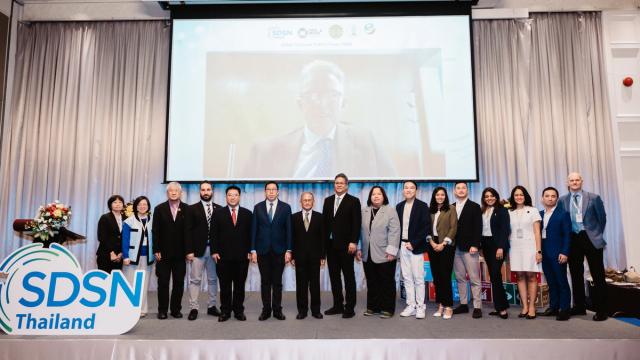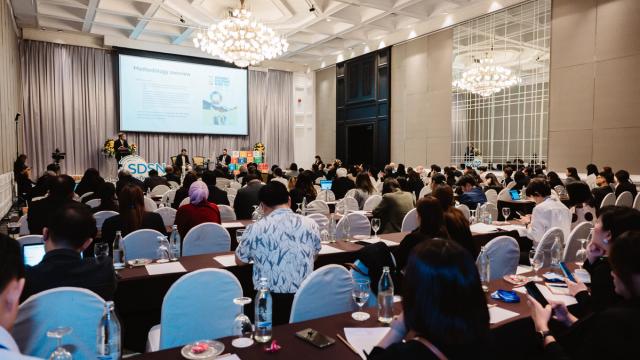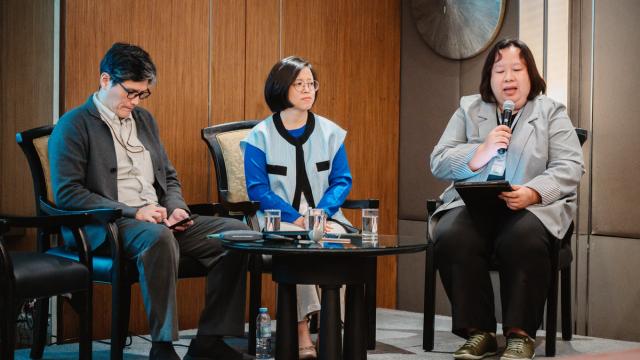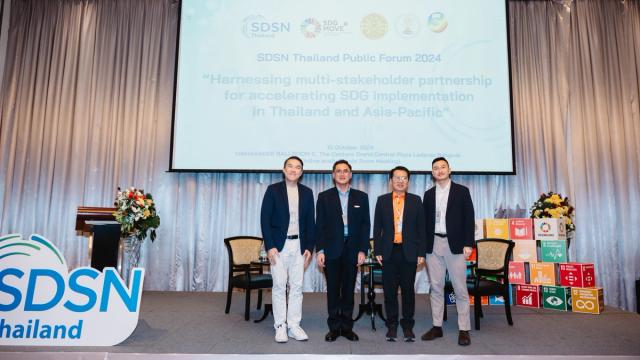SDSN Thailand Public Forum 2024: Harnessing Multi-Stakeholder Partnership for SDG Implementation
On October 10, 2024, the SDSN Thailand Public Forum 2024 convened at the Centara Grand in Bangkok, under the theme of “Harnessing Multi-Stakeholder Partnership for Accelerating SDG Implementation in Thailand and Asia-Pacific.” The event attracted 200 participants, including representatives from government agencies, academia, private enterprises, financial institutions, NGOs, and UN agencies, both onsite and online.
The Forum included opening remark by Professor Surichai Wangaeo, Chair of SDSN Thailand’s Leadership Council, followed by a virtual keynote speech from Professor John Thwaites, Co-Chair of the UN Sustainable Development Solutions Network (SDSN) Leadership Council and Chair of Monash University Australia’s Climateworks Center.
The Forum, marking the official launch of the Thailand chapter of SDSN (SDSN Thailand), brought together stakeholders to engage in meaningful discussions about sustainable development solutions, challenges, and opportunities across sectors. The event focused on four critical areas: sustainable food and agriculture, biodiversity loss and ecosystem, just energy transition, and education for sustainable development (ESD).
Key Thematic Takeaways
Biodiversity loss and Ecosystem
- A central focus for biodiversity preservation is the effective collection, analysis, and management of data, yet the availability of such data remains a key concern.
- To enhance inclusivity and participation, it is crucial to incentivize private sector involvement in Other Effective Area-Based Conservation Measures (OECMs). Offering tangible benefits to businesses can stimulate participation. Additionally, financial mechanisms must be developed to ensure sustainable outcomes on-the-ground.
- We must aim to minimize ecological harm by reducing subsidies for land use that negatively impacts biodiversity. Preventative actions are often less costly than uncertain and expensive restoration efforts. Moreover, integrating a biodiversity fund into ecosystem management frameworks ensures that environmental care benefits everyone.
Education for Sustainable Development
- The current education curriculum must be updated to reflect contemporary sustainability needs. ESD should be embraced as a lifestyle, integrated seamlessly rather than treated as additional work.
- Governments must revise curriculum content with clear guidelines and grant universities greater autonomy in implementing ESD. In Malaysia, overcoming mindset barriers is critical to integrate ESD into existing practices. ESD should not be limited to the Ministry of Education but include practical, real-world learning opportunities.
- While detailed plans and partnerships are promising, success depends on broader stakeholder involvement, community engagement, and greater understanding of on-the-ground realities.
- Progress requires decentralization and a focus on addressing real-world sustainability challenges through active participation and practical strategies.
Just Energy Transition
- Thailand has an opportunity to position itself as a regional leader in the energy transition, leveraging global momentum from COP29 proceedings.
- Economic competitiveness, particularly concerning the Carbon Border Adjustment Mechanism (CBAM), underscores the need for ambitious Nationally Determined Contributions (NDCs).
- Achieving these goals demands significant investment in transportation infrastructure, technological advancements like energy storage systems, and lessons from international experiences.
- Germany’s success demonstrates the importance of strong political will. Meanwhile, Australia’s mixed experience with renewable energy projects and ongoing conflicts of interest highlights the challenges of conflicting energy policies
- Thailand must address renewable energy integration for low- and high-voltage users, with public support and workforce development at the core. Reskilling and upskilling programs are critical to ensuring a just transition.
- As Thailand progresses with NDC 3.0, collective commitment from all stakeholders will be essential for achieving the ambitious decarbonization goals aligned with Asia-Pacific strategies.
Sustainable Food and Agriculture
- A cohesive integration of existing frameworks and clear policy prioritization are essential for sustainable food systems.
- Collaboration among environmental conservation efforts, research institutions, and private and cross-sector partners is vital to driving sustainability initiatives.
- Public awareness plays a crucial role in shaping consumer demand for sustainable food products, while green financial schemes are essential for farmers transitioning to sustainable practices. Strategies should promote food and nutrition literacy, emphasize the benefits of plant-based diets, offer diverse, sustainable food options, and incorporate sustainability education at an early age.
- Provincial and regional initiatives improved health literacy promotion will facilitate sustainable transitions.
- Investments in alternative protein innovation and private-sector engagement represent transformative opportunities. The government's role in promoting sustainable food systems is vital, and the urgent call for accelerated action emphasizes the need for research, policy alignment, and effective collaboration in building resilient food supply chains.
- Empowering communities to identify research needs and contribute to solutions is crucial. Addressing persistent malnutrition requires a multi-sectoral approach as Thailand works toward achieving the Sustainable Development Goals (SDGs) by 2030.
The SDSN Thailand Public Forum 2024 fostered a collaborative environment where stakeholders shared knowledge and developed actionable strategies towards achieving the SDGs. By facilitating partnerships across sectors, the Forum underscored the collective commitment required to address sustainability challenges in Thailand and throughout the Asia-Pacific region. This initiative will pave the way for continued dialogue and collaboration in pursuit of a more sustainable future.



